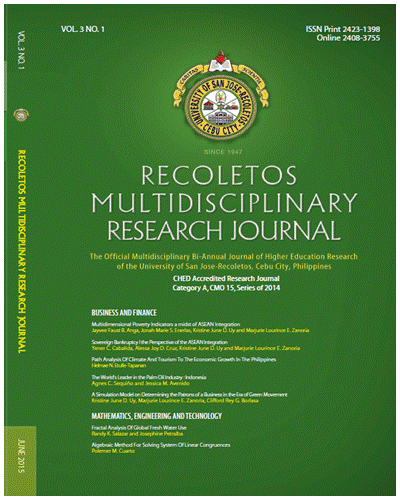Tourism and Hospitality Management Students undergoing US Work and Travel Program: A Phenomenological Inquiry
DOI:
https://doi.org/10.32871/rmrj1503.01.11Keywords:
International Internship, international placement, on-line media, computer-mediated conferencing, internship experiencesAbstract
Tourism professionals expect universities to produce graduates who could deliver and perform functions based on industry standards. Universities have long integrated International Placements to heighten student competencies, bridge the gap between theoretical awareness and industry practice, and meet the expectations of the practitioners. However, there have been reports of unfavorable encounters of students on placement abroad such as being homesick, feeling out of place, and difficulty in reconciling expectation-reality gaps. These are the key issues that hinder students from optimizing international exposure programs and compromise the quality of their learning. A phenomenological study was used to examine the lived experiences of the tourism and hospitality management students on international placement. An in-depth interview was conducted as the primary source of data collection. The data were coded and analyzed according to the research questions. The research resulted in three (3) major themes which emerged out of the experiences shared by the student interns: 1.) struggles experienced in foreign country; 2.) skills/strategies to cope with the adversities; 3.) interns communication practices. The results of this study served as the basis in enhancing the e monitoring support system for the internship coordinator in the home university.
References
Alexander, S., & Boud, D. (2001). Learners still learn from experience when online. Teaching and learning online: Pedagogies for new technologies, 3-15.
Anagnostopoulos, A., Kumar, R., & Mahdian, M. (2008, August). Influence and correlation in social networks. In Proceedings of the 14th ACM SIGKDD international conference on Knowledge discovery and data mining (pp. 7-15). ACM.
Aragon, S. R. (2003). Creating social presence in online environments. New directions for adult and continuing education, 2003(100), 57-68.
Barron, P., Maxwell, G., Broadbridge, A., & Ogden, S. (2007). Careers in hospitality management: Generation Y’s experiences and perceptions. Journal of Hospitality and Tourism Management, 14(02), 119-128.
Beggs, B., Ross, C. M., & Goodwin, B. (2008). A comparison of student and practitioner perspectives of the travel and tourism internship. Journal of Hospitality, Leisure, Sport and Tourism Education, 7(1), 31-39.
Busby, G., & Gibson, P. (2010). Tourism and hospitality internship experiences overseas: A British perspective. Journal of Hospitality, Leisure, Sport and Tourism Education, 9(1), 4-12.
Callanan, G., & Benzing, C. (2004). Assessing the role of internships in the career-oriented employment of graduating college students. Education+ Training, 46(2), 82-89.
Chu, S. K., Chan, C. K., & Tiwari, A. F. (2012). Using blogs to support learning during internship. Computers & Education, 58(3), 989-1000.
Cottrell, N. B., Wack, D. L., Sekerak, G. J., & Rittle, R. H. (1968). Social facilitation of dominant responses by the presence of an audience and the mere presence of others. Journal of personality and social psychology, 9(3), 245.
Cresswell, John W. (2013) Qualitative Inquiry and Research Design: Choosing Among Five Approaches. SAGE Publications, Inc.
Cullen, F. (2010). Phenomenological Views and Analysis of Culinary Arts Students’ International Internships:“The Educational Psychology and Nature of Being†Before, During, and After International Culinary Internship. Journal of Culinary Science & Technology, 8(2-3), 106-126.
Davis, M., Bolding, G., Hart, G., Sherr, L., & Elford, J. (2004). Reflecting on the experience of interviewing online: perspectives from the Internet and HIV study in London. AIDS care, 16(8), 944-952.
Doering, A., Hughes, J., & Huffman, D. (2003). Preservice teachers: Are we thinking with technology?. Journal of Research on Technology in Education,35(3), 342-361.
Fong, L. H. N., Luk, C., Leung, D., & Law, R. (2013). Sharing Internship Experience on the Internet: A Study of Tourism and Hotel Management College Students. In Information and Communication Technologies in Tourism 2014 (pp. 785-797). Springer International Publishing.
Graf, N. M., & Stebnicki, M. A. (2002). Using e-mail for clinical supervision in practicum: A qualitative analysis. Journal of Rehabilitation, 68(3), 41.
Gault, J., Leach, E., & Duey, M. (2010). Effects of business internships on job marketability: the employers’ perspective. Education+ Training, 52(1), 76-88.
Gerken, M., Rienties, B., Giesbers, B., & Könings, K. D. (2012). Enhancing the Academic Internship Learning Experience for Business Education—A Critical Review and Future Directions. In Learning at the Crossroads of Theory and Practice (pp. 7-22). Springer Netherlands.
Grant, T., & Dajee, K. (2003). Types of task, types of audience, types of actor: interactions between mere presence and personality type in a simple mathematical task. Personality and individual differences, 35(3), 633-639.
Gunawardena, C. N., & Zittle, F. J. (1997). Social presence as a predictor of satisfaction within a computerâ€mediated conferencing environment. American journal of distance education, 11(3), 8-26.
Hall, B., & Henningsen, D. D. (2008). Social facilitation and human–computer interaction. Computers in Human Behavior, 24(6), 2965-2971.
Kidd, T. T. (Ed.). (2009). Online Education and Adult Learning: New Frontiers for Teaching Practices: New Frontiers for Teaching Practices. IGI Global.
Kling, R., Rosenbaum, H., & Sawyer, S. (2005). Understanding and communicating social informatics: A framework for studying and teaching the human contexts of information and communication technologies. Information Today, Inc.
Downloads
Published
How to Cite
Issue
Section
License
Copyright of the Journal belongs to the University of San Jose-Recoletos


